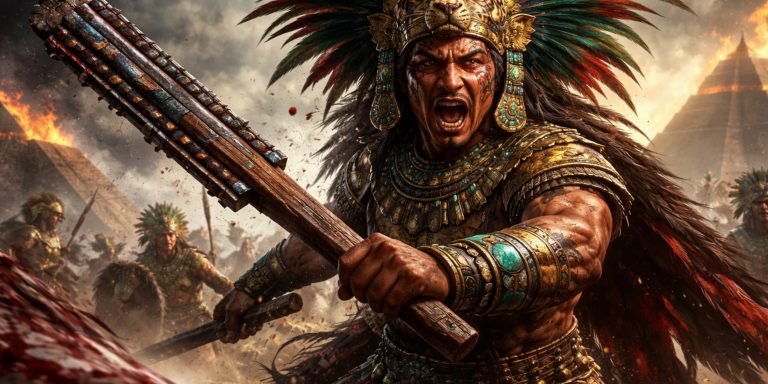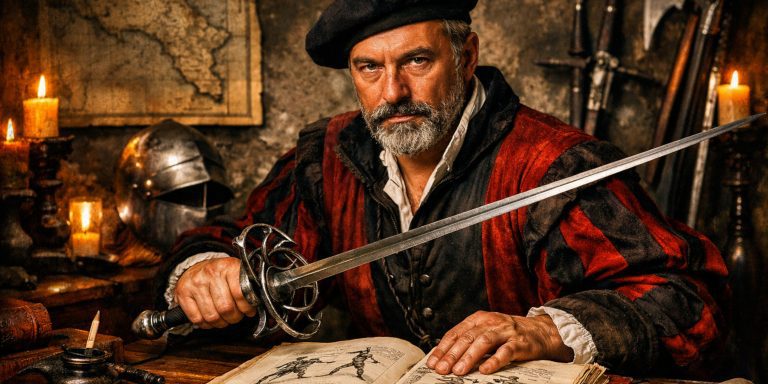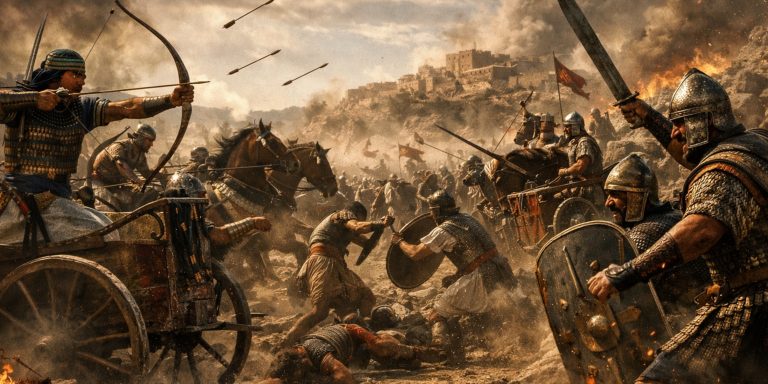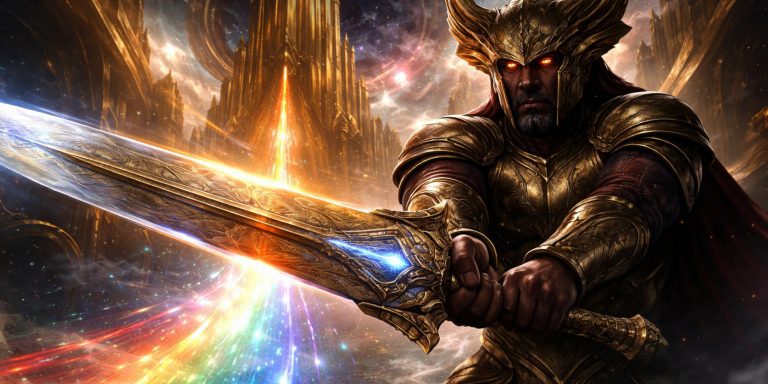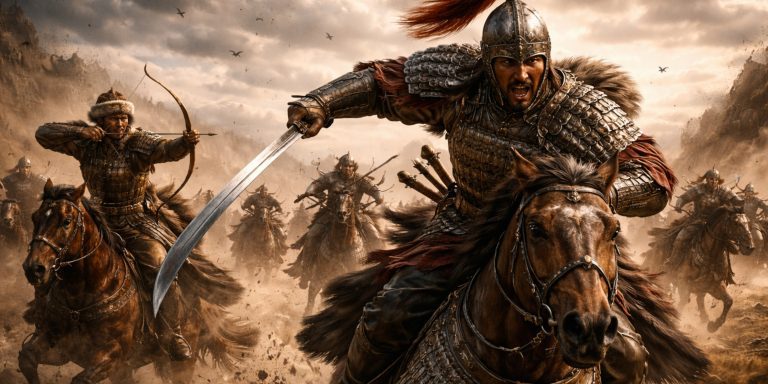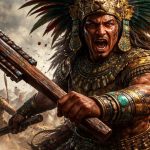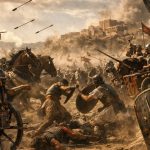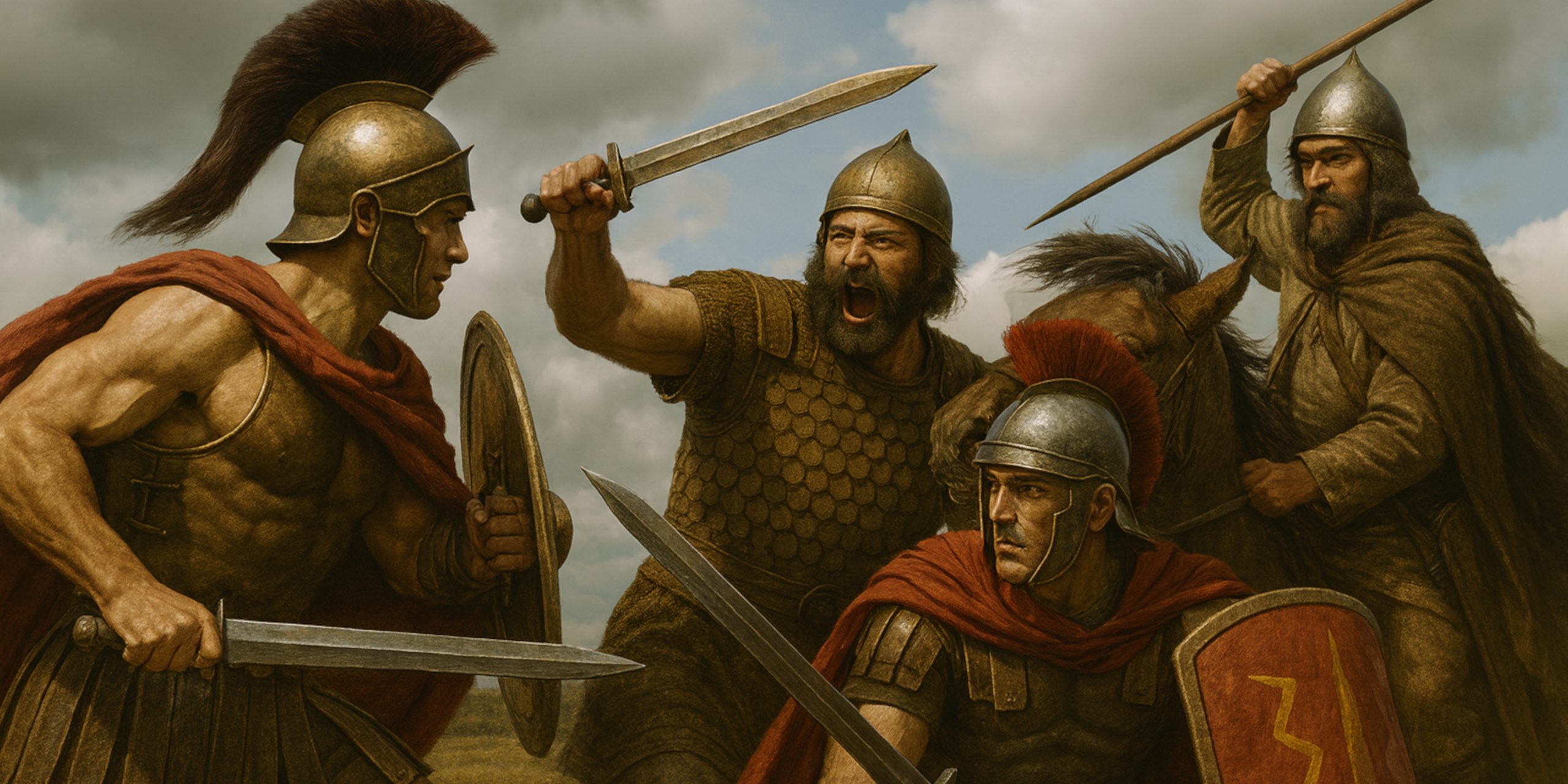
The wars of antiquity forged empires, toppled kingdoms, and laid the cultural foundations of later civilisations. Some were vast campaigns fought across continents, while others were shorter but decisive turning points. Presented in reverse order, these are the twenty largest and most consequential wars of the ancient world, with their commanders, armies, swords, outcomes, legacies, and major battles.
18. The Pyrrhic War (280–275 BC)
| Aspect | Detail |
|---|---|
| Commanders | Pyrrhus of Epirus; Publius Valerius Laevinus; Manius Curius Dentatus |
| Troops | 25,000–30,000 per side |
| Swords Used | Roman gladius (early form); Greek xiphos; sarissa (pike) |
| Outcome | Rome resisted Pyrrhus’ advances |
| Legacy | Demonstrated Roman resilience and paved the way for dominance in Italy |
Major Battles:
- Battle of Heraclea (280 BC): Pyrrhus defeats the Romans with war elephants.
- Battle of Asculum (279 BC): Costly Pyrrhic victory.
- Battle of Beneventum (275 BC): Rome secures the advantage.
17. The Social War (91–88 BC)
| Aspect | Detail |
|---|---|
| Commanders | Gaius Marius; Lucius Cornelius Sulla; Quintus Poppaedius Silo |
| Troops | Around 100,000 on each side |
| Swords Used | Roman gladius; Italic short swords |
| Outcome | Rome granted citizenship to allies |
| Legacy | Internal strain set the stage for Roman civil wars |
Major Battles:
- Siege of Asculum (89 BC): Romans suppress a major rebel stronghold.
- Campaigns in Samnium and Apulia: Stubborn Italian resistance.
16. The Sicilian Wars (580–265 BC)
| Aspect | Detail |
|---|---|
| Commanders | Dionysius of Syracuse; Timoleon; Hamilcar; Himilco |
| Troops | 20,000–40,000 per campaign |
| Swords Used | Greek xiphos; Carthaginian curved swords; Iberian falcata |
| Outcome | Neither Greeks nor Carthaginians achieved lasting supremacy |
| Legacy | Weakened both powers, preparing the ground for Roman intervention |
Major Battles:
- Battle of Himera (480 BC): Greek victory against Carthage.
- Battle of Crimissus (339 BC): Timoleon defeats Carthaginian forces.
15. The Samnite Wars (343–290 BC)
| Aspect | Detail |
|---|---|
| Commanders | Roman consuls; Samnite tribal leaders |
| Troops | Tens of thousands per campaign |
| Swords Used | Roman gladius; Samnite short swords |
| Outcome | Rome defeated the Samnites |
| Legacy | Secured Rome’s dominance in central Italy |
Major Battles:
- Battle of the Caudine Forks (321 BC): Roman humiliation.
- Battle of Sentinum (295 BC): Decisive Roman victory.
14. The Seleucid–Parthian Wars (247–129 BC)
| Aspect | Detail |
|---|---|
| Commanders | Antiochus III; Demetrius II; Mithridates I; Phraates II |
| Troops | Seleucid forces 40,000; Parthian cavalry 20,000–30,000 |
| Swords Used | Greek xiphos; kopis; Parthian spathae |
| Outcome | Parthians gained Mesopotamia and Iran |
| Legacy | Seleucid power collapsed; Parthia rose as Rome’s eastern rival |
Major Battles:
- Battle of Mount Labus (36 BC, later campaign): Parthian cavalry supremacy.
- Sieges across Media: Shift of regional power.
13. The Jewish–Roman Wars (66–135 AD)
| Aspect | Detail |
|---|---|
| Commanders | Vespasian; Titus; Hadrian; Simon bar Kokhba |
| Troops | Rome 60,000–80,000; Jewish rebels up to 100,000 |
| Swords Used | Roman gladius; spatha; Jewish curved swords |
| Outcome | Rome suppressed the revolts |
| Legacy | The destruction of Jerusalem and dispersal of the Jewish population |
Major Battles:
- Siege of Jerusalem (70 AD): Temple destroyed.
- Battle of Betar (135 AD): Bar Kokhba revolt crushed.
12. The Trojan War (c. 12th century BC, legendary)
| Aspect | Detail |
|---|---|
| Commanders | Agamemnon; Achilles; Odysseus; Priam; Hector |
| Troops | Legendary figures suggest tens of thousands |
| Swords Used | Bronze leaf-shaped swords; spears; bows |
| Outcome | Troy destroyed |
| Legacy | Central to Greek myth and cultural identity |
Major Battles:
- Iliadic duels: Achilles and Hector.
- Sack of Troy: Wooden horse stratagem.
11. The Gallic Wars (58–50 BC)
| Aspect | Detail |
|---|---|
| Commanders | Julius Caesar; Vercingetorix |
| Troops | Romans 50,000–60,000; Gauls up to 250,000 |
| Swords Used | Gladius; Gallic longswords; spathae |
| Outcome | Gaul annexed by Rome |
| Legacy | Elevated Caesar, leading to the fall of the Republic |
Major Battles:
- Battle of Bibracte (58 BC): Caesar’s first major victory.
- Siege of Alesia (52 BC): Vercingetorix defeated.
10. The Macedonian Wars (214–148 BC)
| Aspect | Detail |
|---|---|
| Commanders | Philip V; Perseus; Titus Quinctius Flamininus; Lucius Aemilius Paullus |
| Troops | 30,000–40,000 phalangites; Roman legions of similar size |
| Swords Used | Macedonian xiphos; sarissa pikes; Roman gladius |
| Outcome | Rome defeated Macedon |
| Legacy | Greece absorbed into Roman control |
Major Battles:
- Battle of Cynoscephalae (197 BC): Roman flexibility defeated Macedonian phalanx.
- Battle of Pydna (168 BC): Rome’s decisive victory ended Macedonian independence.
9. The Roman–Parthian Wars (53 BC–217 AD)
| Aspect | Detail |
|---|---|
| Commanders | Crassus; Trajan; Septimius Severus; Surena; Artabanus IV |
| Troops | 30,000–60,000 per campaign |
| Swords Used | Roman gladius and spatha; Parthian spathae; cavalry sabres |
| Outcome | Borders shifted, no lasting victor |
| Legacy | Created a long-standing frontier rivalry between Rome and Persia |
Major Battles:
- Battle of Carrhae (53 BC): Roman army annihilated by Parthian cavalry.
- Trajan’s Eastern Campaigns (114–117 AD): Rome briefly captured Mesopotamia.
8. The Mithridatic Wars (88–63 BC)
| Aspect | Detail |
|---|---|
| Commanders | Mithridates VI of Pontus; Lucius Cornelius Sulla; Lucullus; Pompey |
| Troops | Pontus up to 120,000; Rome 40,000–60,000 |
| Swords Used | Roman gladius; Greek xiphos; Iberian falcata |
| Outcome | Rome annexed Asia Minor |
| Legacy | Extended Roman hegemony into the eastern Mediterranean |
Major Battles:
- Battle of Chaeronea (86 BC): Sulla crushed Pontic forces in Greece.
- Battle of Orchomenus (86 BC): Decisive Roman victory.
- Pompey’s campaigns (66–63 BC): Mithridates defeated, Pontus absorbed.
7. The Diadochi Wars (322–275 BC)
| Aspect | Detail |
|---|---|
| Commanders | Antigonus; Seleucus; Ptolemy; Lysimachus |
| Troops | 40,000–60,000 per army |
| Swords Used | Macedonian sarissa; Greek xiphos and kopis |
| Outcome | Alexander’s empire fragmented |
| Legacy | Shaped the Hellenistic kingdoms of Seleucid, Ptolemaic, Antigonid, and Lysimachid realms |
Major Battles:
- Battle of Ipsus (301 BC): Antigonus killed, empire divided.
- Battle of Corupedium (281 BC): Lysimachus defeated, leaving Seleucus dominant.
6. The Roman Civil Wars (133–30 BC)
| Aspect | Detail |
|---|---|
| Commanders | Marius; Sulla; Julius Caesar; Pompey; Octavian; Mark Antony |
| Troops | Tens of thousands per faction |
| Swords Used | Roman gladius; spatha in later phases |
| Outcome | Octavian triumphed, founding the Roman Empire |
| Legacy | End of the Republic, beginning of Imperial Rome |
Major Battles:
- Battle of Pharsalus (48 BC): Caesar defeated Pompey.
- Battle of Philippi (42 BC): Octavian and Antony defeated Caesar’s assassins.
- Battle of Actium (31 BC): Octavian defeated Antony and Cleopatra.
5. The Persian–Roman Wars (92 BC–627 AD)
| Aspect | Detail |
|---|---|
| Commanders | Trajan; Julian; Heraclius; Shapur I; Khosrow II |
| Troops | Tens of thousands per campaign |
| Swords Used | Roman gladius and spatha; Persian straight swords and sabres |
| Outcome | Prolonged stalemate, heavy losses on both sides |
| Legacy | Exhausted Rome and Persia, paving the way for Islamic conquests |
Major Battles:
- Battle of Edessa (260 AD): Emperor Valerian captured by Shapur I.
- Battle of Dara (530 AD): Byzantine victory under Belisarius.
- Battle of Nineveh (627 AD): Heraclius broke Sassanian power.
4. The Peloponnesian War (431–404 BC)
| Aspect | Detail |
|---|---|
| Commanders | Pericles; Alcibiades; Brasidas; Lysander |
| Troops | Athens 30,000 hoplites; Sparta 20,000 hoplites plus allies |
| Swords Used | Greek xiphos and kopis |
| Outcome | Sparta defeated Athens |
| Legacy | Left Greece weakened and divided, paving the way for Macedon |
Major Battles:
- Battle of Sphacteria (425 BC): Athenian victory over Spartans.
- Sicilian Expedition (415–413 BC): Catastrophic Athenian defeat.
- Battle of Aegospotami (405 BC): Sparta destroyed the Athenian fleet.
3. The Macedonian Conquests of Alexander (334–323 BC)
| Aspect | Detail |
|---|---|
| Commanders | Alexander the Great; Darius III |
| Troops | Macedonians 40,000; Persians 100,000+ |
| Swords Used | Macedonian xiphos; kopis; Persian akinakes |
| Outcome | Persia collapsed, Alexander’s empire spanned from Greece to India |
| Legacy | Spread of Hellenistic culture across Asia |
Major Battles:
- Battle of Granicus (334 BC): First victory against Persia.
- Battle of Issus (333 BC): Alexander routed Darius.
- Battle of Gaugamela (331 BC): Decisive Macedonian triumph.
2. The Greco–Persian Wars (499–449 BC)
| Aspect | Detail |
|---|---|
| Commanders | Darius I; Xerxes I; Miltiades; Themistocles; Pausanias |
| Troops | Persia 100,000–200,000; Greece 30,000–40,000 |
| Swords Used | Greek xiphos and kopis; Persian akinakes |
| Outcome | Persian invasions defeated |
| Legacy | Preserved Greek independence, securing cultural influence |
Major Battles:
- Battle of Marathon (490 BC): Athenians defeated Persia.
- Battle of Thermopylae (480 BC): Spartan sacrifice.
- Battle of Salamis (480 BC): Naval turning point.
- Battle of Plataea (479 BC): Decisive Greek land victory.
1. The Punic Wars (264–146 BC)
| Aspect | Detail |
|---|---|
| Commanders | Hannibal Barca; Hasdrubal; Scipio Africanus; Marcus Atilius Regulus |
| Troops | Hundreds of thousands across three wars |
| Swords Used | Roman gladius; Iberian falcata; Carthaginian curved swords |
| Outcome | Rome annihilated Carthage |
| Legacy | Rome became the Mediterranean’s unchallenged superpower |
Major Battles:
- Battle of Cannae (216 BC): Hannibal’s double envelopment destroyed a Roman army.
- Battle of Zama (202 BC): Scipio Africanus defeated Hannibal.
- Siege of Carthage (149–146 BC): Final destruction of Carthage.

